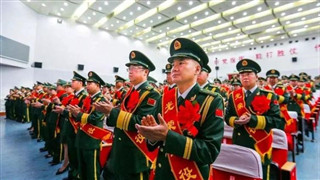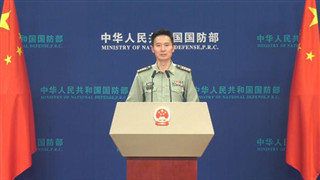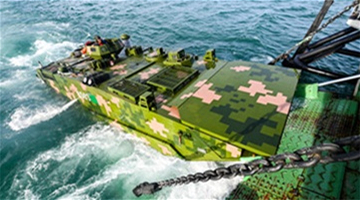近一段时间来,日本变本加厉炒作钓鱼岛问题,日媒大肆渲染中国海警船在钓鱼岛海域“连续巡航112天创下纪录”。一些政党和议员鼓噪修改《自卫队法》,允许自卫队舰艇在钓鱼岛海域执行警戒监视任务,并可使用武器“自卫”。一些前自卫队高官和学者在媒体上耸人听闻地分析中国“武装夺岛”计划。美日频频搞联合“夺岛”军演。政府高层在各种外交活动中言必谈涉华海洋问题。
Recently, Japan has been beefing up its rhetoric and actions over the Diaoyu Islands issue, as the Japanese media hyped up the patrol of China Coast Guard (CCG)vessels in waters off Diaoyu Islands, calling it a record of 112 consecutive days. Some political parties and lawmakers of Japan clamored for amending the Self-Defense Forces Act to allow SDF vessels to perform alert and surveillance tasks in waters off Diaoyu Islands and to have the right to use weapons for “self-defense”. Some former senior officials and scholars with the SDF sensationally analyzed the so-called “armed seizure” plan of China via the media. Besides, the US and Japan frequently carried out joint military exercises to “capture the islands”. Their high-level government officials tend to talk about China-related maritime issues in whatever diplomatic activities they attend.
日方大肆炒作钓鱼岛问题动机有三:一是对华施压。希望通过制造国际舆论压力逼退中国海上巡航,维护日方所谓“实控”地位。二是转移矛盾。疫情冲击下日本经济复苏艰难,民心不稳,菅义伟政府执政压力增大,需要通过渲染危机、对外示强凝聚民意支持。三是服务政治议程。自民党政权以修宪强军为执政目标,炒作钓鱼岛“危机”可为军事松绑提供新的借口。
There are three motives for Japan’s hyping up the Diaoyu Islands issue. First, this is a measure to exert pressure on China. It is hoped that by inventing pressure from international community, China will be forced to retreat from its routine patrols, so as to maintain the so-called “actual control” position of Japan. Second, this is a way to divert contradictions. Under the COVID-19 epidemic, it’s pretty difficult for Japan’s economy to recover, resulting in its domestic instability and escalating pressure on the Suga administration. It is, thereby, necessary to build public support through exaggerating the crisis and displaying strength to the outside world. Third, this is a tool to serve the political agenda. The Liberal Democratic Party of Japan has a long-cherished goal of revising the country’s pacifist constitution and strengthening the country’s military power. Sensationalizing the “crisis” of Diaoyu Islands can provide a new excuse for its military deregulation.
日方需要认识到,炒作钓鱼岛问题的做法既不会影响中方有理有节维护钓鱼岛主权的行动,也无法缓解日本面临的安全焦虑,只会损害日本自身的长远利益。
The Japanese side, however, has to realize that the hype of the Diaoyu Islands issue will not affect China’s actions to safeguard its sovereignty over Diaoyu Islands in a reasonable and restrained manner on just grounds, nor will it alleviate the security anxiety faced by Japan; instead, it can only harm Japan’s long-term interests.
首先,日本炒作中国“夺岛”本身就是伪命题。中方在钓鱼岛问题上一贯坚持“主权在我”立场,同时也始终主张“搁置争议,共同开发”,要求日方正视争议现实,通过对话磋商管控矛盾,妥善处理。如果日方不采取登岛、抓人等侵害中国主权立场的挑衅行动,中方也没有理由采取进一步维权行动。而且日方隐而不报的一个重要事实是,去年以来日本右翼势力不断乘渔船在钓鱼岛海域挑衅滋事,迫使中方不得不加大巡航力度维护主权立场。
First of all, Japan’s hyping up China’s “capture of Diaoyu Islands” itself is but a false proposition. As for the issue, China has always expressed its position on defending its territorial sovereignty over Diaoyu Islands. Meanwhile, China has always advocated the principle of “shelving differences and seeking joint development”, Japan thereby is required to face the reality of disputes, manage and control contradictions through dialogue and consultation, and handle them properly. If Japan does not take provocative actions such as landing on the islands and arresting people thereon that violate China’s sovereign position, China will not take further actions to defend its rights. Moreover, an important fact that Japan has not reported is that since last year, the right-wing forces of Japan have continuously provoked troubles in the waters off Diaoyu Islands with fishing boats, forcing China to increase its patrol efforts to maintain its territorial sovereignty.
其次,日方指责中方“改变现状”是倒打一耙。造成钓鱼岛局势紧张的根源在于2012年日方的“国有化”行动,中方采取常态化巡航在后。
Secondly, the Japanese side has shifted the blame onto China by accusing China of “attempting to alter the status quo” in the East China Sea. The root cause of the tension over Diaoyu Islands lies in the Japanese move to “nationalize” the islands proposed in 2012, and since then, the Chinese side has taken regular patrol operations.
再次,日方操弄钓鱼岛问题的政治后果十分危险。人为放大中日间的矛盾对立,误导民众片面看待领土争端,制约了通过对话合作处理问题的空间,最终也会使日本对华政策被极端民粹主张所绑架,反噬自身内外政策回旋空间。
Thirdly, Japan’s manipulation of the Diaoyu Islands issue tends to be risky in terms of political consequences. This is to deliberately amplify the China-Japan contradictions, misleading the people to view territorial disputes one-sidedly, restricting the space for dealing with the issue through dialogue and cooperation, and ultimately making Japan-crafted China policies kidnapped by extreme populist claims which may counteract Japan’s domestic and foreign policy room for maneuver.
近年来,日本力推“印太合作”和“价值观外交”,以高调姿态活跃在国际社会。在风光热闹的表象背后,却与亚洲邻国深陷外交困境。日本国内有识之士也指出,“远交近攻”解决不了日本自身面临的发展困境。如果无法赢得周边邻国的谅解和尊重,日本终究无法成为真正的大国。
In recent years, Japan has promoted “Indo-Pacific cooperation” and “values-oriented diplomacy” and has been active in the international community with a high-profile posture. Behind the lively appearance, it’s been in a deep diplomatic dilemma with its Asian neighbors. The far-sighted personages in Japan also pointed out that the tactic of “befriending a distant state while attacking a neighboring state” cannot solve the development dilemma facing Japan itself. If failing to win the understanding and respect of neighboring countries, Japan can never develop into a real superpower after all.
中日关系是极为复杂多维的双边关系,钓鱼岛问题不是两国关系的全部,应当摆在适当的位置上。双方互为近邻和主要经贸伙伴,利益上的一致性远大于对立性。明年中日将迎来邦交正常化50周年,能否管控矛盾分歧,确立契合新时代需要的相互认知和政策取向,事关两国人民的福祉和东亚地区长治久安。为此,首先需要日方正确定位和慎重处理钓鱼岛问题。
China and Japan are in bilateral relations of extreme complexity and multi-dimension. The Diaoyu Islands issue, which is just part of their overall bilateral relationship, is supposed to be handled properly. The two sides are close neighbors and major economic and trade partners, the interest consistency of which far outweighs their antagonism. With 2022 marking the 50th anniversary of the normalization of China's diplomatic ties with Japan, whether or not the two sides can manage differences and establish a mutual understanding and policy orientation that meet the needs of the new era has a bearing on the well-being of the two peoples and the enduring peace and stability in East Asia. To this end, the Japanese side must take the initiative to correctly position and handle the Diaoyu Islands issue with great care.
(作者是中国国际问题研究院亚太研究所特聘研究员)
(The author is a senior researcher of the Department for Asia-Pacific Studies at the China Institute of International Studies.)
Editor's note: This article is originally published on huanqiu.com.cn, and is translated from Chinese into English and edited by the China Military Online. The information, ideas or opinions appearing in this article do not necessarily reflect the views of eng.chinamil.com.cn.











